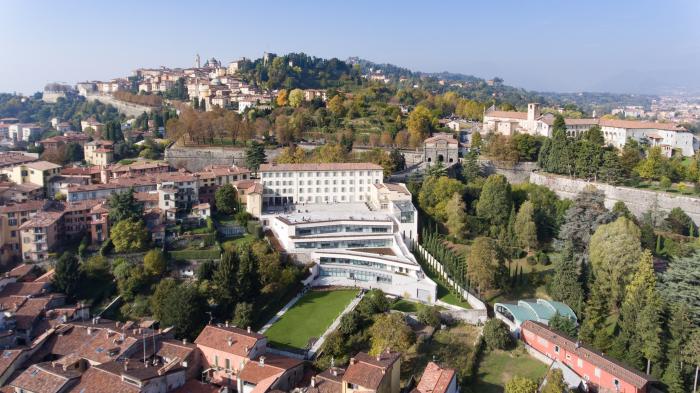Menu top
Master's degree program | Inter-university with Università di Pavia and IUSS Pavia
The Master's Degree Course in Philosophical knowledge: foundations, methods, applications is unique in the panorama of university higher education in Italy, aiming for the highest standards of excellence.

The course is characterised by a new and profound focus on the applied dimensions of philosophical knowledge, methods and practices, on the assumption that models of rationality, tools for conceptual analysis and techniques for rational argumentation must play an increasingly central role in decision-making and problem-solving processes in the economic, technological, business, political and social spheres in the broadest sense.
With this in mind, the program combines fundamental disciplines of philosophical enquiry with a number of scientific and technological disciplines, facilitating a wide range of professional opportunities for students. Major teaching areas include: metaphysics, ontology, epistemology, ethics, the philosophy of science, mind, logic and mathematics, together with scientific-technological subjects such as economics and business management, robotics, artificial intelligence, the neuroscience of decision-making, technology transfer and the environmental and economic challenges of sustainability.
The course adopts a highly interactive teaching methodology, integrating lectures and labs, as well as a qualifying internship program.
It also encourages international study visits, offering a wide range of exchange opportunities for its students.
The first year of the degree explores, with all the relevant technicalities, updates and historical insights, the fundamental debates still evolving in such central disciplines of philosophical enquiry as ontology and metaphysics, ethics and bioethics, epistemology, the philosophy of logic and mathematics, philosophy of language, philosophy of science, philosophy of the mind and the cognitive sciences, argumentation theory, philosophy of technology and artificial intelligence. A substantial training of these disciplines is aimed at giving students a strong background for further study and research at doctoral level.
In the second year, the curriculum is enriched with a wide range of lessons and workshops in scientific and technological fields on topics such as economics and business management, robotics and machine ethics, the neuroscience of decision-making, the environmental, economic and social challenges of sustainability, digital innovation and technology transfer, healthcare engineering and economics, data analysis, management and communication, applied ontologies and other transdisciplinary and applied areas of inquiry. These classes will train students to apply the skills of philosophical analysis and rational argumentation learned in the first year in several executive fields, so as to preparing them for a wide range of professions in the areas of business, communication and human resource management.
In addition to the natural career opportunities in teaching, the degree aims at preparing its graduates to pursue an academic career by accessing a competitive PhD programs. It also provides its students with training designed to guarantee them job opportunities in the areas of business, communication and human resources management.
This is a professional figure essential to companies that produce goods and services, in both private and public sectors. Thanks to the ability to read and interpret data and to organise and coordinate teamwork, he/she is able to perform management and business consultancy functions, as well as towork in the field of inter-company relations, with particular regard to coordinating working groups, mediating between parties, analysing complex situations and identifying effective problem-solving strategies.
This professional figure can find place in public and private companies in the fields of communication, management of inter-company relations and cultural development. Her/his profile include strong skills in the areas of co-planning analytical and decision-making processes, valorising skills and competences within unitary strategies, and problem-solving using theoretical and formal analysis tools. The work organisation specialist can act as a consultant or manager within the company, as well as an expert in inter-company relations, with a particular focus on coordinating work groups and mediating between parties.
This professional figure is able to play strategic roles in the field of communication and publishing, as well as in the organisation of cultural events and in the preparation of communication materials. This profile is characterised by the ability to interpret cultural needs, analyse complex situations and articulate effective communication strategies. Graduates with these skills can spacialize as consultants in public relations and in publiching and communicationcompanies, as well as cultural mediators.
This professional figure is able to carry out philosophical consulting activities, coordinate working groups, analyse complex issues, and develop arguments and ways of research and thinking. The philosopher is able to develop the contents of his/her discipline through the use of theoretical and formal critical tools, to construct effective syntheses, to elaborate cultural perspectives and contents useful for the dissemination of philosophical knowledge. The philosopher can work as a teacher, specialist in theoretical research and philosophical counselling, author of texts and as a manager of cultural content and scientific dissemination in publishing companies.
This professional figure is able to take on the direction of publishing series, organise cultural events, prepare content for dissemination and the third mission, and develop autonomous research in the field of philosophical studies. This profile is qualified by an in-depth knowledge of the discipline and by the exercise of a marked critical capacity in making judgements, constructing theoretical syntheses, elaborating new cultural perspectives, constructing content that can be used by the general public, accessing the documentary heritage, and drafting functional reports for decision-makers in both the public and private sectors. Graduates with these skills can embark on various careers: academic lecturer and specialist in theoretical research, relations manager with entities operating in the field of third mission, communication manager and organiser of cultural events.
This figure is capable of teaching the fundamentals of the philosophical, historical, pedagogical and demo-anthropological disciplines in secondary schools and of undertaking management and coordination responsibilities. The teacher is qualified by expertise in the philosophical disciplines and the ability to communicate the taught content clearly and thoroughly. This figure can act as a teacher (for graduates who have sufficient credits in the appropriate subject groups), an intercultural mediator and a theoretical researcher.
This professional figure is capable of coordinating work groups, providing support for the definition of individual training and/or professionalisation projects, supporting processes of professional reintegration and entry into the world of work. This figure is characterised by in-depth disciplinary and critical knowledge, by the ability to assist and advise the person in making choices more consistent with their aspirations and skills. This professional figure may operate as a school and career guidance counsellor, as an informant for young people and those seeking employment or retraining.
Pre-enrolment and enrollment
There is a single time window related to the entire process (pre-registration + enrollment) from 1st April 2024 and 21st October 2024.
The pre-enrolment is a procedure that allows the candidates to share the key documents needed to prove that they comply with the admission requirements. The documents will be assessed by our administration.
Click here to register at the university.
Once registered, please select: registrar’s office > admission test > Master’s degree (two years) and pre-enroll.
The pre-enrolment cost is Euros 52.
Costs and Fees
University yearly fees are calculated progressively, more favorably for students who have a low income and meet merit requirements. The maximum yearly fee is Euros 1.783. For a simulation of tuition fees due in your case and for more information, please contact laura.fratus@unibg.it
Non Eu-Students
Non EU-students may need to perform additional steps. Please contact international.students@unibg.it for any questions.

The University of Bergamo is an institution where the future is generated through a thought process that puts people at the center. As an inclusive community, it promotes the value of dialogue to create space for new forms of encounter and sharing. Connected to the territory, it contributes to its cultural and productive growth through research that fosters innovation and widespread knowledge through various events and initiatives.
Alongside a high-quality education, students can also take advantage of opportunities and personal growth experiences, such as studying abroad through more than 300 Erasmus agreements and completing an internship through over 4,000 activated agreements. This helps to build a curriculum that meets the demand for highly qualified professionals in the local, national, and international job market.
Choosing the University of Bergamo means experiencing a journey that will help you better understand the reality that surrounds you in the city that, together with Brescia, has been the Italian Capital of Culture 2023.